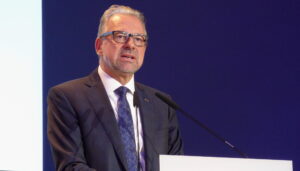At the 13th European Space Conference Jan. 12, Thierry Breton, commissioner for the internal market at the European Union, extended an olive branch to ESA, saying the agency was critical to achieving its goals in space.
“The European space policy will continue to rely on ESA and its unique technical, engineering and science expertise,” he said. “ESA will continue to be the European agency for space matters. If we are to be successful in our European strategy for space, and we will be, I will need ESA by my side.”
Breton thanked outgoing ESA Director General Jan Wörner for his leadership of the agency since 2015 and anticipated good relations with Wörner’s successor, Josef Aschbacher. “I am also looking forward to start working with Josef Aschbacher in a spirit of trust and ambition for European space.”
At an ESA press briefing two days later, Aschbacher reciprocated. “I found it very encouraging the statements he made for ESA,” he said, referring to Breton’s speech. “ESA is an essential partner for space in Europe, and I would really like to make ESA the main agency, the go-to agency of the European Commission for all its flagship programs.”
ESA is already partnered with the EU on its two current flagship space programs, the Copernicus series of Earth observation satellites and the Galileo satellite navigation system, with ESA providing technical oversight and, in the case of Copernicus, some of the funding. The EU, though, has shown an interest expanding into new areas, a move perceived by some in the European space community as encroaching on ESA’s turf.
One example is a recent decision by the European Commission to rebrand its European Global Navigation Satellite Systems Agency, known as GSA and responsible for the Galileo program, as the European Union Space Program Agency (EUSPA) with a broader mandate to oversee EU space activities. The name suggested that the EU was seeking to develop a potential rival to ESA.
“My job is to try to make things work much more efficiently,” Breton said when asked about the rationale for creating EUSPA during a briefing after his conference speech. “As we move from development to exploitation, we needed to rethink our governance.”
An EU official, speaking on background, acknowledged the new name of the agency prompted concerns at ESA. “There have been those outside who felt that this was a move designed to limit somehow the role of ESA, which is not we want and what we believe,” the official said.
“ESA and EUSPA have a key role to play,” the official added, “and they have specific roles and specific competencies.” ESA’s focus will be on technical issues with EU space programs, while EUSPA will handle operations of those programs.
While both EU and ESA officials spoke favorably about working with each other, the two organizations are still negotiating a new agreement governing that cooperation. The Financial Framework Partnership Agreement (FFPA) governs the roles and responsibilities between the two organizations, but they missed a goal of completing it by the end of last year.
The EU official said that the commission “was about to conclude” the agreement with ESA, but didn’t give a timetable for doing so beyond completing it “in the next weeks.”
“We are discussing it day by day,” Wörner said at the ESA briefing. “We hope that we can conclude this in the very near future.”
He didn’t discuss specific issues still being negotiated between ESA and the EU in that agreement beyond issued regarding contracting authority. “For several points we have an agreement. There are some points where it is still being discussed,” he said.
“My hope is that, in the next weeks, where we have several meetings with the European Commission and with EUSPA, that we find a solution that is acceptable for the EU, for the EU member states, for ESA and for the ESA member states,” he said. “I am optimistic that we will find a solution.”



